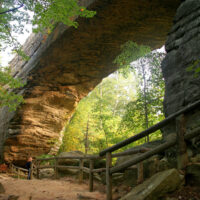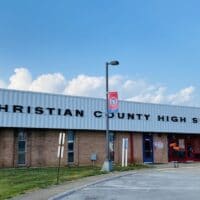The last time I went to North Carolina, I hit a bear with my Buick.
I was headed toward Asheville on Interstate 40 having just passed through Tennessee. It was dark, but I saw the young bear in my headlights as it crawled over a concrete barrier at the edge of the right shoulder and lumbered into my lane. I knew there was at least one tractor-trailer behind me, so I didn’t brake. I gripped the steering wheel hard and expected any moment to be shoved into another vehicle’s path.
But the car held, and on I went. Many miles down the interstate I pulled over and saw the damage. The impact had shattered a huge section of the car’s body on the right front side, but it didn’t affect the engine or the wheel alignment.
Every time I tell someone this story, the first thing they want to know is if I killed the bear.
If you’ve ever driven the curvy, mountainous stretch into North Carolina, you probably understand why I didn’t stop to check on the bear. There’s no stopping on that section of I-40. The shoulders on the right and left are too narrow to attempt pulling over, especially at night.
But to answer the question everyone asks, I’m pretty sure the bear didn’t make it.
That trip was about four years ago.
A week ago Friday, I was headed back to North Carolina to visit friends and relatives for the first time since the coronavirus pandemic started. I left Hopkinsville early enough to make sure I wouldn’t be on the interstate after dark with wild animals, and I arrived at my destination just as the sun was setting.
All was well. Not a bear nor a deer in sight.
The next morning I got a clear view of the fall foliage around the small community of Highlands. It was brilliant red, yellow and orange. The views showed me that the timing of the trip was perfect. I had been anticipating this visit for months.
(If this were a movie script, you would sense about now that I was being set up for something awful.)
Here’s what happened:
Shortly before lunchtime on my first day in North Carolina, the transmission went out in my Chevy Equinox. It failed in downtown Highlands, bustling with Saturday morning activity and lots of traffic. As my vehicle refused to budge at a green light, a line of cars honked until a good guy jumped from his family’s minivan and pushed my SUV onto a side street.
A transmission failure is bad enough at home. Now imagine this happening more than 400 miles from home while the country is sputtering back to life from the pandemic with supply chain woes and a shortage of vehicles on the market.
The biggest headache, aside from learning the cost of the eventual repairs, was not being able to rent a car one-way back to Kentucky. I like to think I’m pretty resourceful, but I couldn’t even get a U-Haul pickup truck.
A friend who lives near Highlands was a very generous host and invited me to stay for a week while we waited on the Chevy dealer in a neighboring town to confirm the damage. I never made it to the second leg of my trip near Charlotte to visit my aunt and uncle, and a friend from graduate school.
My husband drove out to collect me, and we arrived home Saturday afternoon. I prayed a few times along the way that nothing would strike or harm John’s beloved Pontiac — because you know they don’t make those anymore.
Now my crippled Chevy sits behind a service department in Franklin, N.C.
I used to think that hitting a bear in the foothills of the Smoky Mountains was unbelievably bad luck.
Until I lost my transmission in a little mountain town far from home in the thick of a weird economy that seems to guarantee delays more than anything else. That transmission might come in a couple of weeks, they said. If I’m lucky. Actually, I felt very lucky Saturday afternoon when John and I rolled into Hoptown. I don’t know when I’ve ever been happier to be back home.
Jennifer P. Brown is co-founder, publisher and editor of Hoptown Chronicle. You can reach her at editor@hoptownchronicle.org. She spent 30 years as a reporter and editor at the Kentucky New Era. She is a co-chair of the national advisory board to the Institute for Rural Journalism and Community Issues, governing board president for the Kentucky Historical Society, and co-founder of the Kentucky Open Government Coalition.


